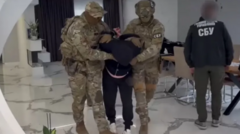As Russia celebrates the 80th anniversary of its victory over Nazi Germany, President Vladimir Putin oversaw a grand military parade in Moscow, attended by significant international figures including China's Xi Jinping. This display is seen as an attempt by Putin to position himself as a central figure in a coalition of anti-Western nations, showcasing support amidst ongoing challenges in the Russia-Ukraine conflict. The turnout of international dignitaries has been interpreted as a sign of Russia's diplomatic reach, despite suffering a protracted military campaign in Ukraine. While the day is meant to signify unity through historical triumph, it is also reflective of the deepening divisions within Russia today.
Putin’s Grand Display: A Symbol of Alliance Amidst War Struggles

Putin’s Grand Display: A Symbol of Alliance Amidst War Struggles
The Russian leader utilizes Victory Day to assert global leadership and unite anti-Western states despite territorial setbacks.
Putin, celebrating the 80th anniversary of the Soviet victory over Nazi Germany, hosted a notable military parade in Moscow reassuring his place as a leader among emerging anti-Western coalitions, notably alongside China's Xi Jinping. This significant event saw the presence of additional global leaders, signaling a semblance of international support for Russia, despite the failures on the battlefield in Ukraine and a struggling economy facing high inflation. The parade contrasts sharply with the ongoing war that has not delivered the decisive victories promised by Putin, revealing a growing divide between the past's glories and today’s discord.





















